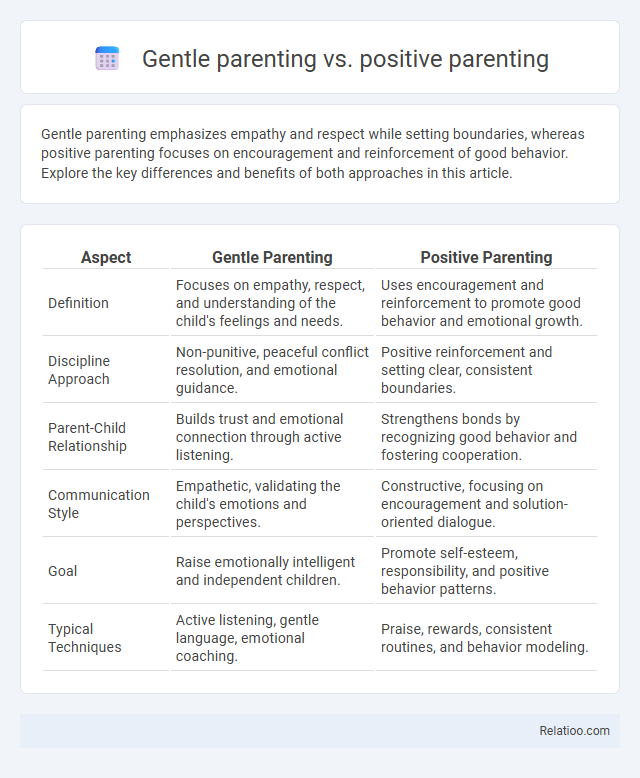Gentle parenting emphasizes empathy and respect while setting boundaries, whereas positive parenting focuses on encouragement and reinforcement of good behavior. Explore the key differences and benefits of both approaches in this article.
Table of Comparison
| Aspect | Gentle Parenting | Positive Parenting |
|---|---|---|
| Definition | Focuses on empathy, respect, and understanding of the child's feelings and needs. | Uses encouragement and reinforcement to promote good behavior and emotional growth. |
| Discipline Approach | Non-punitive, peaceful conflict resolution, and emotional guidance. | Positive reinforcement and setting clear, consistent boundaries. |
| Parent-Child Relationship | Builds trust and emotional connection through active listening. | Strengthens bonds by recognizing good behavior and fostering cooperation. |
| Communication Style | Empathetic, validating the child's emotions and perspectives. | Constructive, focusing on encouragement and solution-oriented dialogue. |
| Goal | Raise emotionally intelligent and independent children. | Promote self-esteem, responsibility, and positive behavior patterns. |
| Typical Techniques | Active listening, gentle language, emotional coaching. | Praise, rewards, consistent routines, and behavior modeling. |
Understanding Gentle Parenting
Gentle parenting emphasizes empathy, respect, and understanding your child's emotions, fostering a secure and trusting relationship. Positive parenting shares similarities by promoting encouragement and constructive guidance but often focuses more on reinforcing good behavior through positive reinforcement. Understanding gentle parenting helps you create a nurturing environment where your child's emotional needs are prioritized over disciplinary measures.
Defining Positive Parenting
Positive parenting emphasizes nurturing a supportive and respect-filled environment, focusing on clear communication, consistent boundaries, and positive reinforcement to guide children's behavior. Gentle parenting shares similarities by promoting empathy and connection but places stronger emphasis on understanding a child's emotional needs without punishment or control. Unlike gentle parenting, which centers on emotional attunement, positive parenting integrates strategies that balance warmth and discipline to encourage responsibility and self-regulation in children.
Core Principles of Gentle Parenting
Gentle parenting centers on empathy, respect, and understanding a child's emotions to foster secure attachment and emotional development. Positive parenting emphasizes encouragement, clear communication, and reinforcing desired behaviors through rewards rather than punishment. Core principles of gentle parenting include consistent boundaries set with compassion, active listening to the child's needs, and prioritizing trust-building over authoritarian discipline.
Key Elements of Positive Parenting
Positive parenting emphasizes nurturing your child's emotional development through consistent support, clear communication, and age-appropriate boundaries, fostering a secure and trusting relationship. Gentle parenting shares similarities by prioritizing empathy and respect, but also incorporates conflict resolution without punitive measures. Understanding key elements of positive parenting, such as encouragement, positive reinforcement, and active listening, helps you build a foundation for your child's healthy growth and self-esteem.
Similarities Between Gentle and Positive Parenting
Gentle parenting and positive parenting both emphasize empathy, respect, and nurturing your child's emotional development, creating a supportive environment for healthy growth. You will find that both approaches avoid harsh punishments, instead using understanding and clear communication to guide behavior. These parenting styles prioritize building strong parent-child connections through patience and consistent encouragement.
Differences Between Gentle and Positive Parenting
Gentle parenting emphasizes empathy, respect, and understanding a child's feelings, focusing on nurturing emotional intelligence through calm guidance. Positive parenting centers on reinforcing good behavior with encouragement and consistent discipline to promote self-esteem and social skills. Your choice between gentle and positive parenting impacts how you address challenges, where gentle parenting prioritizes emotional connection and positive parenting focuses on behavior management.
Benefits of Gentle Parenting
Gentle parenting emphasizes empathy, respect, and understanding to nurture a strong emotional bond between you and your child, promoting healthier communication and emotional intelligence. Positive parenting shares similar goals but focuses more on reinforcement and encouragement to develop your child's self-esteem and cooperative behavior. The benefits of gentle parenting include reduced behavioral issues, increased trust, and enhanced emotional development, making it a compassionate approach that supports your child's overall well-being.
Advantages of Positive Parenting
Positive parenting emphasizes clear boundaries and consistent discipline while fostering emotional warmth and open communication, which promotes child development and self-discipline. It enhances a child's social skills and emotional intelligence by encouraging empathy and respect through positive reinforcement and active listening. Unlike gentle parenting, which prioritizes empathy and minimal discipline, positive parenting balances nurturing with structure, leading to improved long-term behavioral outcomes and stronger parent-child relationships.
Challenges Faced by Parents Using Each Approach
Gentle parenting challenges include maintaining consistent boundaries while fostering empathy and understanding, often requiring significant emotional patience. Positive parenting demands balancing positive reinforcement with clear expectations, which can be difficult when immediate behavioral improvements are not evident. Your experience may vary with gentle parenting, positive parenting, or a blend of both, as each approach involves navigating unique difficulties related to communication, discipline, and emotional connection.
Choosing the Right Parenting Style for Your Family
Gentle parenting emphasizes empathy, respect, and understanding a child's emotions, fostering secure attachment and emotional intelligence, while positive parenting focuses on reinforcement of good behavior through encouragement and consistent boundaries to promote self-discipline and confidence. Choosing the right parenting style involves assessing your family's unique dynamics, values, and the specific needs of your child to create a supportive and nurturing environment. Integrating elements from both gentle and positive parenting can provide a balanced approach that encourages healthy development and meaningful parent-child relationships.

Infographic: Gentle parenting vs positive parenting
 relatioo.com
relatioo.com